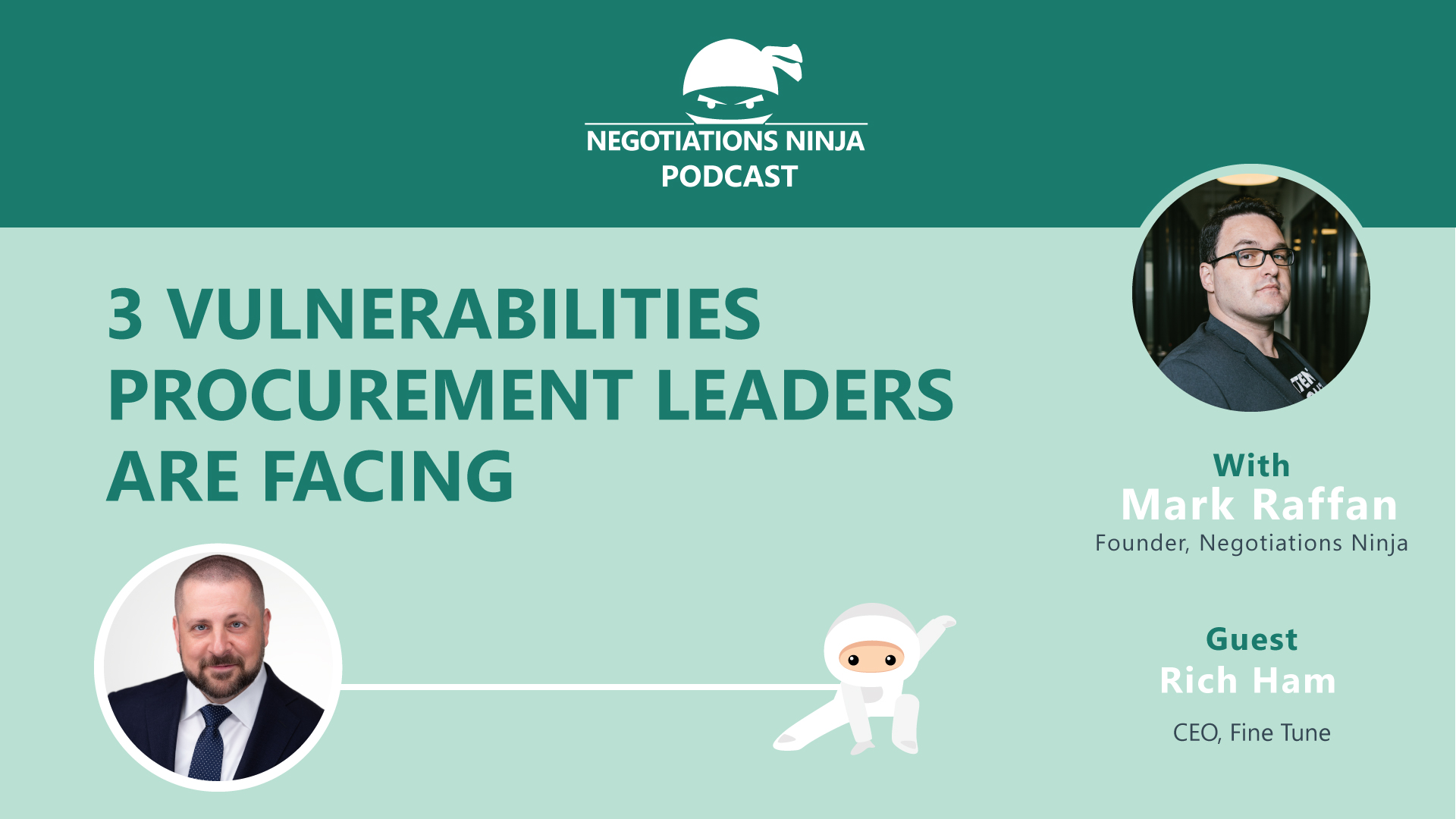Procurement hasn’t kept pace with overall corporate growth. As a result, today’s procurement leaders are being asked to do the work of 2–3 people. They can’t perform the same tasks that they may have been able to complete 15 years ago. The reality has created new vulnerabilities: the inability to manage expenses, develop required relationships, and the threat of lost business. Rich Ham discusses the 3 vulnerabilities procurement leaders are facing in this episode of Negotiations Ninja.
Outline of This Episode
- [1:30] Learn all about Rich Ham
- [2:54] 3 vulnerabilities that procurement leaders are facing
- [11:25] Why isn’t procurement growing?
- [13:28] Can service vendors’ actions be justified?
- [17:07] Areas that are commonly overcharged
- [21:18] The one thing that is never disputed
- [23:58] How procurement can defend their interests
- [28:43] Where should a procurement team start?
- [31:13] Inflationary considerations are real—so what’s the problem?
- [33:07] How to connect with Rich Ham
Vulnerability #1: The inability to manage expenses
Procurement has lost the ability to engage in any sort of expense management. “Category management” has been stripped down so that it lacks management in its entirety. It seems that procurement can only get contracts out the door and respond to urgent issues. Suppliers have responded to this inability to engage in ongoing expense management by developing a huge range of strategies for driving spend up after new contracts go live. It erodes the efforts of procurement.
Vulnerability #2: The inability to develop required relationships
Procurement needs to build solidarity with internal stakeholders, operators, P&L owners, etc. But most haven’t had the time to get to know their own teammates and field operators and to cultivate relationships. Suppliers have noticed this and taken the time to build those relationships with field operators, eroding procurements’ leverage when it comes to contract negotiations. The key stakeholders in your business might know and like the supplier more—that’s a problem.
Vulnerability #3: The threat of lost business
There has to be a threat for your adversary if things go wrong and you don’t give in to what’s being asked of you. But the threat of lost business has been eroded. Indirect suppliers have learned that procurement doesn’t have the time to navigate complex and cumbersome supplier transitions.
When this first began, Rich saw a wave of short-term extensions—suboptimal deals—put in place. Even worse, procurement is usually aware of this but doesn’t have the time to act on open market opportunities. So they agreed on extensions to buy themselves time. Now, suppliers demand 3-5 year contracts at a significant increase. The balance of power has shifted to favor indirect suppliers.
Rich points out that we’re seeing more and more anti-competitive behaviors and anti-competitive language in supplier contracts. Behaviorally, we’re seeing extreme hostility toward things like audits, third-party augmentation, and more.
As procurement has leaned out, an arena of new and innovative solutions to help procurement do the work of 2-3 people has emerged. Suppliers realize that they need to stop them and are becoming more hostile to third-party management.
Rich believes that if you don’t find yourself in intense disputes with indirect suppliers, it means that you aren’t actively working to defend your own bottom line. You’re likely paying 30–40% margins for your indirect services. Any attempt to manage down is met with hostility.
So, where should procurement teams start? How can you begin to defend your interests in a world that seems to favor indirect suppliers? Listen to the whole episode to hear what Rich believes can be done to combat the 3 vulnerabilities procurement leaders are facing.
Resources & People Mentioned
- Richard Ham: Journalist to Master Negotiator, Ep #157
- A Discussion on Labor Spend with Rich Ham, Ep #233
- The Kraft/Heinz settlement with the SEC
Connect with Rich Ham
Connect With Mark
- Follow Negotiations Ninja on Twitter: @NegotiationPod
- Connect with Mark on LinkedIn
- Follow Negotiations Ninja on LinkedIn
- Connect on Instagram: @NegotiationPod




